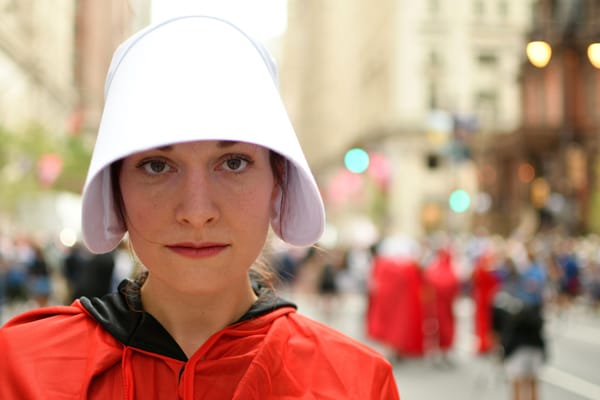“Fuck the church! Fuck the state! You can’t make us procreate!” Thousands of marchers streamed past St. Patrick’s Cathedral on Friday night, protesting the reversal of Roe v. Wade. They hurled epithets, hands raised in defiance, and paused to chant before the neo-gothic edifice. Across the street, unnoticed and unopposed, rose the towers of Rockefeller Center, monuments to a different kind of power—one based not on religious authority, patriarchal force, or political sovereignty, but on the reign of capital in the name of progress.
This is the power that rules the lives of American women and determines the patterns of their fertility. Its god isn’t the father above, but Prometheus, who gave fire to man and whose gilded statue adorns the plaza. Its icons aren’t virgin mothers, but workers who tame nature by wielding technology, like the figures depicted in “American Progress,” the center’s grand mural.
If some regimes have measured the worth of women by their ability to contribute to national fertility, ours assesses them in terms of their contributions to gross domestic product. In May, Janet Yellen, the Treasury secretary, warned that “eliminating the right of women to make decisions about when and whether to have children would have very damaging effects on the economy.” A study from the Institute for Women’s Policy Research estimated that already-existing state-level restrictions on abortion cost the nation nearly $105 billion per year. The institute’s CEO told Forbes that with the reversal of Roe, “the economic impact will be exponentially higher.”
Of course, most pro-choice rhetoric is more subtle. It promises not to increase GDP, but to give women freedom to pursue meaningful careers. The dissenting justices in Dobbs v. Jackson Women’s Health Organization noted that the reversal of Roe “diminishes women’s opportunities to participate fully and equally in the nation’s political, social, and economic life,” because abortion availability has “large effects on women’s education, labor-force participation, occupations, and earnings.”
“Legal abortion ensured that nothing need come before a woman’s career.”
Feminism, which once envisioned alternatives to capitalism, is now invoked to justify capitalism’s present form. It maximizes profits while promising liberation. The destruction of the family wage, hailed as a sign of progress for women, created a larger and cheaper labor pool. Likewise, legal abortion spared women “the blanket accusation that they’re going to be divided in their loyalty to their career because they’re going to have children,” in the words of a pro-choice activist quoted by the sociologist Kristin Luker in her classic 1984 study, Abortion and the Politics of Motherhood.
Women must make sacrifices to maintain their place in the labor force. “No Forced Birth” was the demand printed on several signs at the march. But “forced birth” is almost the opposite of the threat American women face. As The New York Times reported in 2018, “the gap between the number of children that women say they want to have (2.7) and the number of children they will probably actually have (1.8) has risen to the highest level in 40 years.” So it’s true that the intentions of American women are being frustrated, and they are being denied control of their fertility. But they are having fewer children than they want, not more.
Both supporters and opponents have reasons to overstate the immediate effects of the high-court ruling, but its symbolic importance can’t be denied. Dobbs falsifies the progressive vision of history. In her book, Luker found that “most pro-life people have a deep faith in God, they also believe in the rightness of his plan for the world. They are therefore skeptical about the ability of individual humans to understand, much less control, events.”
By contrast, “the pro-choice view is not centered around a divine being, but rather around a belief in the highest abilities of human beings.” For Luker’s pro-choice interviewees, “reason—the human capacity to use intelligence, rather than faith, to understand and alter the environment—is at the core of their world.” They therefore believe that “humans should use th[eir] intellect to solve the problems of human existence” and look on the professed humility of pro-lifers as a fatalism that stands in the way of progress.
On Friday, one woman held a sign saying, “We Will Not Go Back.” Another held a placard with the words, “My Body, My Right … Not Going Back.” One man held up a drawing of a brontosaurus next to the words “Dinosaur Ruling Backward.” They were appealing to the longstanding association in the American mind between abortion and progress. For more than a century, this association has worked to the advantage of abortion supporters, lending their cause an aura of inevitability. The reversal of Roe imperils this momentum. For pro-choice people, not just abortion, but their entire vision of progress is now in doubt.
That is why a woman dressed in a red cloak and white hood posed on Friday night before the doors of the Church of Our Saviour on Park Avenue, and why so many stopped to photograph her. With her head covered and bowed, she conjured a fearful vision of a future in which women are not free. The protesters could not see that they have been, and remain, the handmaids of capital.
